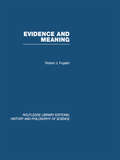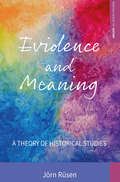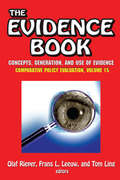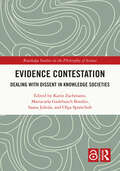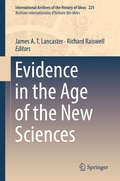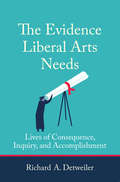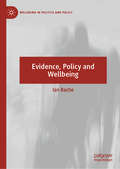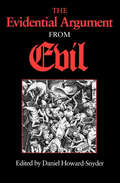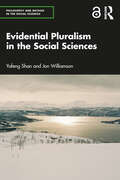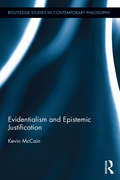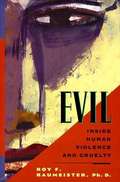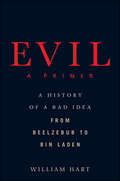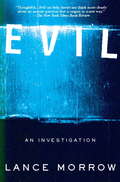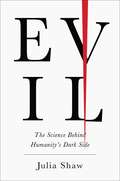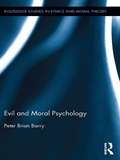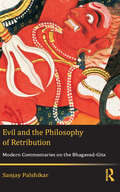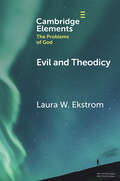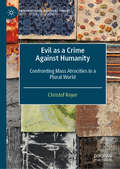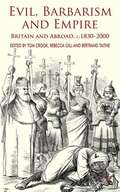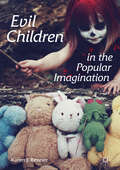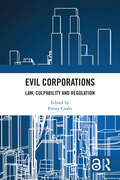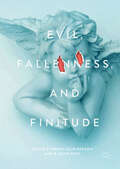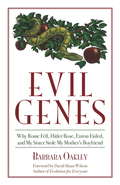- Table View
- List View
Evidence and Meaning: Studies in Analytic Philosophy (Routledge Library Editions: History & Philosophy of Science)
by Robert J FogelinOriginally published in 1967. This is an examination of warrant statements – statements which indicated something about the grounds on behalf of some further judgement, choice or action. The first part of the study is concerned with the role of warrant statements in theoretical discourse; while the second part concerns their role in practical discourse. Also examined are necessity, probability, knowing, seeing and the complex of terms which allow us to introduce an argumentative structure into discourse.
Evidence and Meaning: A Theory of Historical Studies (Making Sense of History #28)
by Jörn RüsenAs one of the premier historical thinkers of his generation, Jörn Rüsen has made enormous contributions to the methods and theoretical framework of history as it is practiced today. In Evidence and Meaning, Rüsen surveys the seismic changes that have shaped the historical profession over the last half-century, while offering a clear, economical account of his theory of history. To traditional historiography Rüsen brings theoretical insights from philosophy, narrative theory, cultural studies, and the social sciences, developing an intricate but robust model of "historical thinking" as both a cognitive discipline and a cultural practice-one that is susceptible neither to naïve empiricism nor radical relativism.
The Evidence Book (Comparative Policy Evaluation Ser.)
by Frans L. LeeuwFirst Published in 2017. Routledge is an imprint of Taylor & Francis, an Informa company.
Evidence Contestation: Dealing with Dissent in Knowledge Societies (Routledge Studies in the Philosophy of Science)
by Karin Zachmann Mariacarla Gadebusch Bondio Saana Jukola Olga SparschuhThis book examines the practices of contesting evidence in democratically constituted knowledge societies. It provides a multifaceted view of the processes and conditions of evidence criticism and how they determine the dynamics of de- and re-stabilization of evidence. Evidence is an essential resource for establishing claims of validity, resolving conflicts, and legitimizing decisions. In recent times, however, evidence is being contested with increasing frequency. Such contestations vary in form and severity—from questioning the interpretation of data or the methodological soundness of studies to accusations of evidence fabrication. The contributors to this volume explore which actors, for what reasons and to what effect, question evidence in fields such as the biological, environmental, and health sciences. In addition to actors inside academia, they examine the roles of various other actors, including citizen scientists, counter-experts, journalists, patients, consumers, and activists. The contributors tackle questions of how disagreements are framed and how they are used to promote vested interests. By drawing on methodological and theoretical approaches from a wide range of fields, this book provides a much-needed perspective on how evidence criticism influences the development and state of knowledge societies and their political condition. Evidence Contestation will appeal to scholars and advanced students working in philosophy of science, epistemology, bioethics, science and technology studies, the history of science and technology, and science communication.
Evidence, Decision and Causality
by Arif AhmedMost philosophers agree that causal knowledge is essential to decision-making: agents should choose from the available options those that probably cause the outcomes that they want. This book argues against this theory and in favour of evidential or Bayesian decision theory, which emphasises the symptomatic value of options over their causal role. It examines a variety of settings, including economic theory, quantum mechanics and philosophical thought-experiments, where causal knowledge seems to make a practical difference. The arguments make novel use of machinery from other areas of philosophical inquiry, including first-person epistemology and the free will debate. The book also illustrates the applicability of decision theory itself to questions about the direction of time and the special epistemic status of agents.
Evidence in the Age of the New Sciences (International Archives of the History of Ideas Archives internationales d'histoire des idées #225)
by James A.T. Lancaster Richard RaiswellThe motto of the Royal Society—Nullius in verba—was intended to highlight the members’ rejection of received knowledge and the new place they afforded direct empirical evidence in their quest for genuine, useful knowledge about the world. But while many studies have raised questions about the construction, reception and authentication of knowledge, Evidence in the Age of the New Sciences is the first to examine the problem of evidence at this pivotal moment in European intellectual history. What constituted evidence—and for whom? Where might it be found? How should it be collected and organized? What is the relationship between evidence and proof? These are crucial questions, for what constitutes evidence determines how people interrogate the world and the kind of arguments they make about it.In this important new collection, Lancaster and Raiswell have assembled twelve studies that capture aspects of the debate over evidence in a variety of intellectual contexts. From law and theology to geography, medicine and experimental philosophy, the chapters highlight the great diversity of approaches to evidence-gathering that existed side by side in the sixteenth and seventeenth centuries. In this way, the volume makes an important addition to the literature on early science and knowledge formation, and will be of particular interest to scholars and advanced students in these fields.
The Evidence Liberal Arts Needs: Lives of Consequence, Inquiry, and Accomplishment
by Richard A. DetweilerEmpirical evidence for the value of a liberal arts education: how and why it has a lasting impact on success, leadership, altruism, learning, and fulfillment.In ongoing debates over the value of a college education, the role of the liberal arts in higher education has been blamed by some for making college expensive, impractical, and even worthless. Defenders argue that liberal arts education makes society innovative, creative, and civic-minded. But these qualities are hard to quantify, and many critics of higher education call for courses of study to be strictly job-specific. In this groundbreaking book, Richard Detweiler, drawing on interviews with more than 1,000 college graduates aged 25 to 65, offers empirical evidence for the value of a liberal arts education. Detweiler finds that a liberal arts education has a lasting impact on success, leadership, altruism, learning, and fulfillment over a lifetime. Unlike other defenders of a liberal arts education, Detweiler doesn&’t rely on philosophical arguments or anecdotes but on data. He developed a series of interview questions related to the content attributes of liberal arts (for example, course assignments and majors), the context attributes (out-of-class interaction with faculty and students, teaching methods, campus life), and the purpose attributes (adult life outcomes). Interview responses show that although both the content of study and the educational context are associated with significant life outcomes, the content of study has less relationship to positive adult life outcomes than the educational context. The implications of this research, Detweiler points out, range from the advantages of broadening areas of study to factors that could influence students&’ decisions to attend certain colleges.
Evidence, Policy and Wellbeing (Wellbeing in Politics and Policy)
by Ian BacheThis book analyses the role of evidence in taking wellbeing from an issue that has government attention to one that leads to significant policy change. In doing so, it draws on contributions from political science, policy theory and literature specifically on the evidence and policy relationship. The book has three main aims: to understand the role of evidence in shaping the prospects for wellbeing in public policy; to inform the barriers literature on the use of evidence in policy; and, to inform the multiple streams approach (MSA) to agenda-setting. While the book focuses on developments at UK government level, a number of the findings and arguments presented here have wider significance, both in relation to wellbeing developments elsewhere and to the theoretical literatures on agenda-setting and evidence use. The book draws on insights from interviews with policy-makers and stakeholders that were undertaken as part of the work of the Community Wellbeing Evidence Programme of the What Works Centre for Wellbeing.
The Evidential Argument from Evil (Indiana Series in the Philosophy of Religion)
by William L. Rowe Paul Draper Richard Swinburne Eleonore Stump Alvin Plantinga William P. Alston Stephen J. Wykstra Peter van Inwagen Bruce Russell Richard M. GaleIs evil evidence against the existence of God? A collection of essays by philosophers, theologians, and other scholars. Even if God and evil are compatible, it remains hotly contested whether evil renders belief in God unreasonable. The Evidential Argument from Evil presents five classic statements on this issue by eminent philosophers and theologians, and places them in dialogue with eleven original essays reflecting new thinking by these and other scholars. The volume focuses on two versions of the argument. The first affirms that there is no reason for God to permit either certain specific horrors or the variety and profusion of undeserved suffering. The second asserts that pleasure and pain, given their biological role, are better explained by hypotheses other than theism. Contributors include William P. Alston, Paul Draper, Richard M. Gale, Daniel Howard-Snyder, Alvin Plantinga, William L. Rowe, Bruce Russell, Eleonore Stump, Richard G. Swinburne, Peter van Inwagen, and Stephen John Wykstra.
Evidential Pluralism in the Social Sciences (Philosophy and Method in the Social Sciences)
by Yafeng Shan Jon WilliamsonThis volume contends that Evidential Pluralism—an account of the epistemology of causation, which maintains that in order to establish a causal claim one needs to establish the existence of a correlation and the existence of a mechanism—can be fruitfully applied to the social sciences. Through case studies in sociology, economics, political science and law, it advances new philosophical foundations for causal enquiry in the social sciences. The book provides an account of how to establish and evaluate causal claims and it offers a new way of thinking about evidence-based policy, basic social science research and mixed methods research. As such, it will appeal to scholars with interests in social science research and methodology, the philosophy of science and evidence-based policy.
Evidentialism and Epistemic Justification (Routledge Studies in Contemporary Philosophy)
by Kevin McCainEvidentialism is a popular theory of epistemic justification, yet, as early proponents of the theory Earl Conee and Richard Feldman admit, there are many elements that must be developed before Evidentialism can provide a full account of epistemic justification, or well-founded belief. It is the aim of this book to provide the details that are lacking; here McCain moves past Evidentialism as a mere schema by putting forward and defending a full-fledged theory of epistemic justification. In this book McCain offers novel approaches to several elements of well-founded belief. Key among these are an original account of what it takes to have information as evidence, an account of epistemic support in terms of explanation, and a causal account of the basing relation (the relation that one's belief must bear to her evidence in order to be justified) that is far superior to previous accounts. The result is a fully developed Evidentialist account of well-founded belief.
Evil: Inside Human Cruelty And Violence
by Roy F. BaumeisterA fascinating study of one of humankind's oldest problems, Evil has profound implications for the way we conduct our lives and govern our society.
Evil?
by Timothy CarterBook of Stuart, Chapter 1:1010. And, yea verily, Stuart did commit the Sin of Onan in the shower. And this was witnessed by his own brother who did cry out unto their mother. And there was much wailing and gnashing of teeth. 11, And the townspeople rose up against him and all Onaners, calling upon one another to tear the youthful sinners limb from unclean limb. And there was much pants wetting. 12 And l0, Stuart did join forces with the demon, Fon Pyre, and together they did set forth to discover the cause of the town's trouble. 13 And, hark! A pair of fallen angels would plant seeds of hatred unto the townspeople. And on the seventh day, Stuart did vow to rip the fallen angels a new one and layeth upon them an epic smacketh-down.
Evil: A Primer
by William Hart"Today our nation saw evil." - President George W. Bush, September 11th 2001Evil! Like a zombie back from the grave, it has arisen--a word many of us had long ago relegated to Sunday sermons, video games and horror flicks. But of course, evil is not old fashioned, nor has it ever gone away, and may be as robust as ever.So what is evil? Does it exist? Veteran journalist Bill Hart tries to drag evil out of the darkness and hold it up to the light. In doing so, he has written a very readable account of 5,000 years of philosophy, theology and human history as it reflects and refines its notion of evil.More than an explanation of why bad things happen, Evil: A Primer is a tour through the nether regions in search of what we really know.
Evil: An Investigation
by Lance MorrowAt the beginning of the twenty-first century, evil remains as potent and radical a force in the world as it has ever been. We all know evil when we encounter it-in the villains of history like Hitler and Stalin, in the routine brutality that makes the nightly news, in the hateful violence of terrorists and sociopaths-but the phenomenon of evil has long resisted explanation. In this singular survey of this mysterious but all too often palpable force, veteran Time magazine essayist Lance Morrow offers a sustained look at the unmistakable ways evil manifests itself in history and in the human heart. This is a provocative meditation on the role evil plays in shaping human history, a timely analysis of how this primitive force can be understood in a modern society of high-tech, sensationalized brutality, and a daring exploration of why evil may be necessary in the world.
Evil: The Science Behind Humanity's Dark Side
by Julia ShawWhat is it about evil that we find so compelling? From our obsession with serial killers to violence in pop culture, we seem inescapably drawn to the stories of monstrous acts and the aberrant people who commit them. But evil, Dr. Julia Shaw argues, is largely subjective. What one may consider normal, like sex before marriage, eating meat, or working on Wall Street, others find abhorrent. And if evil is only in the eye of the beholder, can it be said to exist at all? In [this book], Shaw uses an engrossing mix of science, popular culture, and real-life examples to break down timely and provocative issues. How similar is your brain to a psychopath's? How many people have murder fantasies? Can artificial intelligence be evil? Do your sexual proclivities make you a bad person? Who becomes a terrorist? If you could travel back in time, would you kill baby Hitler? In asking these questions, Shaw urges readers to discover empathy and to rethink and reshape what it means to be bad. [This book] is a wide-ranging exploration into a fascinating, darkly compelling subject from a wickedly smart and talented writer.
Evil and Moral Psychology: Evil And Moral Psychology (Routledge Studies in Ethics and Moral Theory)
by Peter Brian BarryThis book examines what makes someone an evil person and how evil people are different from merely bad people. Rather than focusing on the "problem of evil" that occupies philosophers of religion, Barry looks instead to moral psychology—the intersection of ethics and psychology. He provides both a philosophical account of what evil people are like and considers the implications of that account for social, legal, and criminal institutions. He also engages in traditional philosophical reasoning strongly informed by psychological research, especially abnormal and social psychology. In response to the popularity of phrases like "the axis of evil" and the ease with which politicians and others describe their opponents as "evil," Barry sets out to make clear just what it is to be an evil person.
Evil and the Philosophy of Retribution: Modern Commentaries on the Bhagavad-Gita (100 Cases)
by Sanjay PalshikarWhat is ‘evil’? What are the ways of overcoming this destructive and morally recalcitrant phenomenon? To what extent is the use of punitive violence tenable? Evil and the Philosophy of Retribution compares the responses of three modern Indian commentators on the Bhagavad-Gita — Aurobindo Ghose, Bal Gangadhar Tilak and Mahatma Gandhi. The book reveals that some of the central themes in the Bhagavad-Gita were transformed by these intellectuals into categories of modern socio-political thought by reclaiming them from pre-modern debates on ritual and renunciation. Based on canonical texts, this work presents a fascinating account of how the relationship between ‘good’, ‘evil’ and retribution is construed against the backdrop of militant nationalism and the development of modern Hinduism. Amid competing constructions of Indian tradition as well as contemporary concerns, it traces the emerging representations of modern Hindu self-consciousness under colonialism, and its very understanding of evil surrounding a textual ethos. Replete with Sanskrit, English, Marathi, and Gujarati sources, this will especially interest scholars of modern Indian history, philosophy, political science, history of religion, and those interested in the Bhagavad-Gita.
Evil and Theodicy (Elements in the Problems of God)
by Laura W. EkstromSuffering is ubiquitous. Quests to make sense of it in relation to the existence of God – and to find meaning in our lives in the face of it – are significant aspects of the human experience. Evil and Theodicy motivates the project of theodicy by examining arguments rooted in evil against God's existence and by critically assessing the response of skeptical theism. Ekstrom explores eight different lines of theodicy. She argues that, even if the prospects for theodicy are dim with respect to defending the rationality of theistic belief in light of suffering, nonetheless, work in theodicies is practically useful.
Evil as a Crime Against Humanity: Confronting Mass Atrocities in a Plural World (International Political Theory)
by Christof RoyerThis book seeks to reimagine why and how to confront mass atrocities in world politics. Drawing on Hannah Arendt’s conception of evil, it interprets and understands mass atrocities as ‘evil’ in an ‘Arendtian’ sense, that is, as crimes against human plurality and, thus, crimes against humanity itself. This understanding of mass atrocities paves the way for reframing responses to mass atrocities as attempts to confront evil. In doing so, the book focuses on military intervention under the banner of the Responsibility to Protect (R2P) and judicial intervention by the International Criminal Court (ICC) and reframes them as tools to protect human plurality from evil. Furthermore, the book looks at the place and the role of R2P and the ICC in the changing landscape of world order. It argues that the protection of humanity from evil can serve as a legitimate Grundnorm (basic norm) around which a global constitutional order in an inherently pluralistic world can be constructed.
Evil, Barbarism and Empire
by Tom Crook Rebecca Gill Bertrand TaitheEvil and barbarism continue to be associated with the totalitarian 'extremes' of twentieth-century Europe. Addressing domestic and imperial conflicts in modern Britain and beyond, as well as varied forms of representation, this volume explores the inter-relations of evil, atrocity and civilizational prejudice within liberal cultures of governance.
Evil Children in the Popular Imagination
by Karen J. RennerFocusing on narratives with supernatural components, Karen J. Renner argues that the recent proliferation of stories about evil children demonstrates not a declining faith in the innocence of childhood but a desire to preserve its purity. From novels to music videos, photography to video games, the evil child haunts a range of texts and comes in a variety of forms, including changelings, ferals, and monstrous newborns. In this book, Renner illustrates how each subtype offers a different explanation for the problem of the "evil" child and adapts to changing historical circumstances and ideologies.
Evil Corporations: Law, Culpability and Regulation
by Penny CroftsThis book elaborates and interrogates the idea of evil corporations from a diverse range of disciplines.There has long been awareness of systemic harms inflicted by corporations, but this awareness has rarely led to any effective legal means to prevent and/or respond adequately to them. Lawyers and legal theorists appear to be stuck asking the same questions, and giving the same ineffective answers. Part of the problem, this book maintains, is the relative lack of theoretical interrogation into the nature of corporations as responsible, moral agents. To break this stasis, this book draws upon philosophies of wickedness in order to ask whether or not corporations are, or can be, evil. With contributions from a range of different disciplines, including law, cultural theory, theology, and philosophy, it offers a novel account of how and why corporate wrongs are caused, whilst exploring the extent to which the legal system itself facilitates such wrongdoing.The book targets a broad international audience with research interests in corporate crime. This will be of particular interest to those within the legal discipline, including corporate law, criminal law, corporate crime and law and humanities scholars.Chapter 9 of this book is freely available as a downloadable Open Access PDF at http://www.taylorfrancis.com under a Creative Commons Attribution-Non Commercial-NoDerivatives (CC-BY-NC-ND) 4.0 license.
Evil, Fallenness, and Finitude
by Bruce Ellis Benson B. Keith PuttThis collection addresses the perennial philosophical and theological issues of human finitude and the potentiality for evil. The contributors approach these issues from perspectives in Continental philosophy relating to phenomenology, philosophical hermeneutics, rabbinical traditions, drawing upon the work of Immanuel Kant, S#65533;ren Kierkegaard, and Paul Ricoeur. While centering on the traditional theme of theodicy, this volume is also oriented to the phenomenology of religion, with contributions across religions and intellectual traditions.
Evil Genes: Why Rome Fell, Hitler Rose, Enron Failed, and My Sister Stole My Mother's Boyfriend
by Barbara OakleyA fascinating scientific and personal exploration of the roots of evil, filled with human insight and telling detail. -STEVEN PINKER, Johnstone Professor, Harvard UniversityAuthor of The Language Instinct, How the Mind Works and The Stuff of ThoughtHave you ever met a person who left you wondering, How could someone be so twisted? So evil? Prompted by clues in her sister's diary after her mysterious death, author Barbara Oakley takes the reader inside the head of the kinds of malevolent people you know, perhaps all too well, but could never understand. Starting with psychology as a frame of reference, Oakley uses cutting-edge images of the working brain to provide startling support for the idea that evil people act the way they do mainly as the result of a dysfunction. In fact, some deceitful, manipulative, and even sadistic behavior appears to be programmed genetically-suggesting that some people really are born to be bad. But there are unexpected fringe benefits to evil genes. We may not like them-but we literally can't live without them. Oakley deftly ties together the big picture implications of revolutionary neuroscientific and genetic discoveries, showing the eerily similar behavioral tics of Mao, Stalin, Hitler, and Slobodan Milosevic. The dramatic recent scientific findings presented in Evil Genes shed light not only on dictators far afield, but on politics at home, as well as business, religion, and everyday life. In fact, history itself has been shaped by the strange confluence of genes and environment that science is just now beginning to understand. Oakley links the latest findings of molecular research to a wide array of seemingly unrelated historical and current phenomena, from the harems of the Ottomans and the chummy jokes of Uncle Joe Stalin, to the remarkable memory of investor Warren Buffet. Throughout, she never loses sight of the personal cost of evil genes as she unravels the mystery surrounding her sister's enigmatic life-and death. Evil Genes is a tour de force of popular science writing that brilliantly melds scientific research with intriguing family history and puts both a human and a scientific face to evil. Barbara A. Oakley, PhD (Rochester, MI), has been dubbed a female Indiana Jones-her writing combines worldwide adventure with solid research expertise. Among other adventures, she has worked as a Russian translator on Soviet trawlers in the Bering Sea, served as radio operator at the South Pole Station in Antarctica, and risen from Private to Regular Army Captain in the US Army. Currently an associate professor of engineering at Oakland University in Michigan, Oakley is a recent vice president of the world's largest bioengineering society and holds a doctorate in the integrative discipline of systems engineering.
